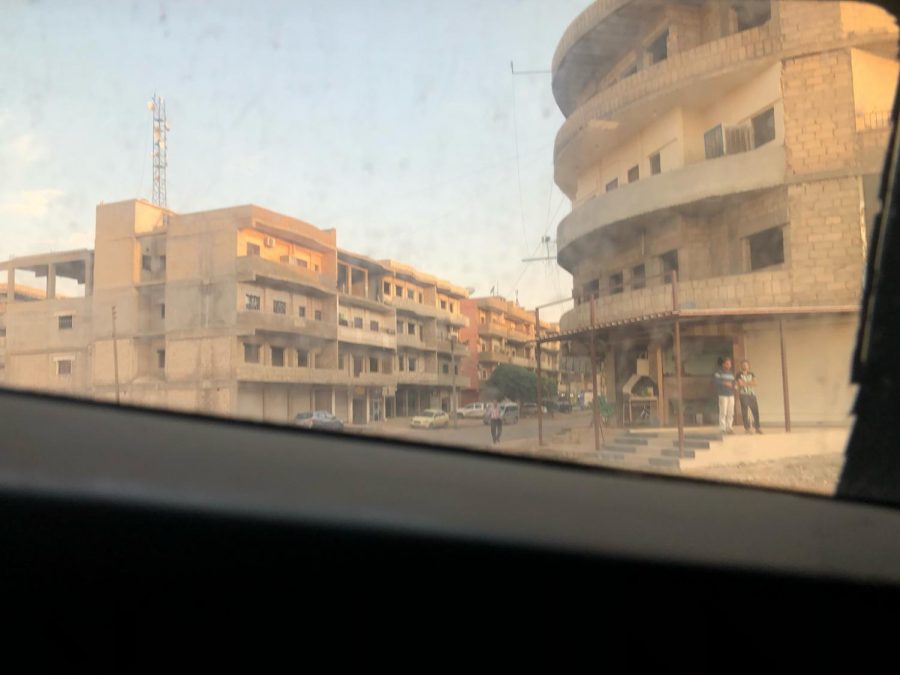The Syrian Civil War affects more than just Syrians
U.S. soldiers wait for transport out of the grim situation in Syria.
January 2, 2020
Roxy Neset
Staff Reporter
Millions of people have been devastated by the Syrian Civil War, and on Oct. 19, President Trump took the U.S. out of it.
The Syrian Civil War originates from nonviolent anti-government protests in March of 2011. The Syrian people were frustrated with their government and wanted change, placing warranted blame for ruining the Syrian economy and taking away personal freedoms on President Bashar al-Assad.
The Syrian government and President al-Assad responded swiftly and mercilessly, killing and imprisoning protestors. Groups of rebels formed, voicing their concerns about the government and soon fighting broke out. Groups like the Syrian Democratic Forces (SDF) and the People’s Protection Units (YPG, or the Kurds) have major stakes in the fight, hoping to overthrow the current totalitarian regime and replace it with a democratic system. Losing the war would mean the absence of many freedoms that are taken for granted in other places of the world.
Citizens of Syria have been under fire for years, and not just from their totalitarian government or corrupt leadership. The Syrians have also been struggling with terrorist attacks coming from the terrorist organization ISIS. The U.S. joined the fight in Syria in 2014, aiding the Syrian rebels in their fight against ISIS with a pivotal impact in 2017: the Shayrat Air Strike.
“Most notably in the 2017 Shayrat airstrike in which the U.S. launched 59 tomahawk missiles at a Regime-controlled airbase. Earlier this year, in March 2019, the military defeat of ISIS was announced. The U.S. has also been supplying weapons and advisors to the SDF,” Lieutenant Shelby Koontz said of U.S. involvement in Syria.
The U.S.’s withdrawal from Syria in Oct. came as a shock to many. When the Turks arrived in Syria, one of their goals was to wipe out Kurdish forces like the Kurdistan Workers’ Party (PKK) and the YPG, groups Turkey classifies as ‘terrorist organizations’. With Americans in the crosshairs of the Kurdish and Turkish fight, “We couldn’t risk being caught between the two,” Koontz said.
Many Syrians have evacuated Syria because of the Civil War. The United Nations High Commissioner for Refugees (UNHCR) reports over 3.6 million Syrian refugees are currently living in Turkey. Living conditions are grim, and there is little hope of being taken in by a country other than Turkey or Syria.
“It’s an incredibly sad situation…currently, reports claim that Turkish ‘proxy armies’ (who invaded Northern Syria in early/mid-Oct.) are abusing civilians, looting homes, beating and killing civilians, and executing prisoners,” Koontz said of the displaced Syrians.
Efforts to return the refugees to their home have been made, Koontz said.
United Nations Children’s Fund (UNICEF) refugee camps are bleak and provide little comfort to refugees.
“As for the refugees in Turkey, the Turkish government wants to move them to a ‘safe zone’ which they are trying to establish in Northern Syria right now,” Koontz said. As of now, the future of Syria is up in the air, especially with the recent withdrawal of the United States. The uprooted Syrians are in a specially dangerous situation because returning to their county means facing violence without protection, but staying in the refugee camps in Turkey can be equally, if not more, dangerous.
“As for U.S. impact, I’m honestly not sure. The U.S. hasn’t taken many, if any, refugees from this area. If anything we’ve done humanitarian aid and those kinds of missions, but I don’t think we’ve done anything politically significant,” Koontz said.
The Syrian Civil War is one of the least publicized conflicts going on in the world. Even so, millions are affected by what happens in Syria, and many are willing to risk their lives to fight for democracy and freedom. While the Syrian Civil War may not be known to all, the conflict’s result will impact civilians, rebels, and soldiers alike.






























































